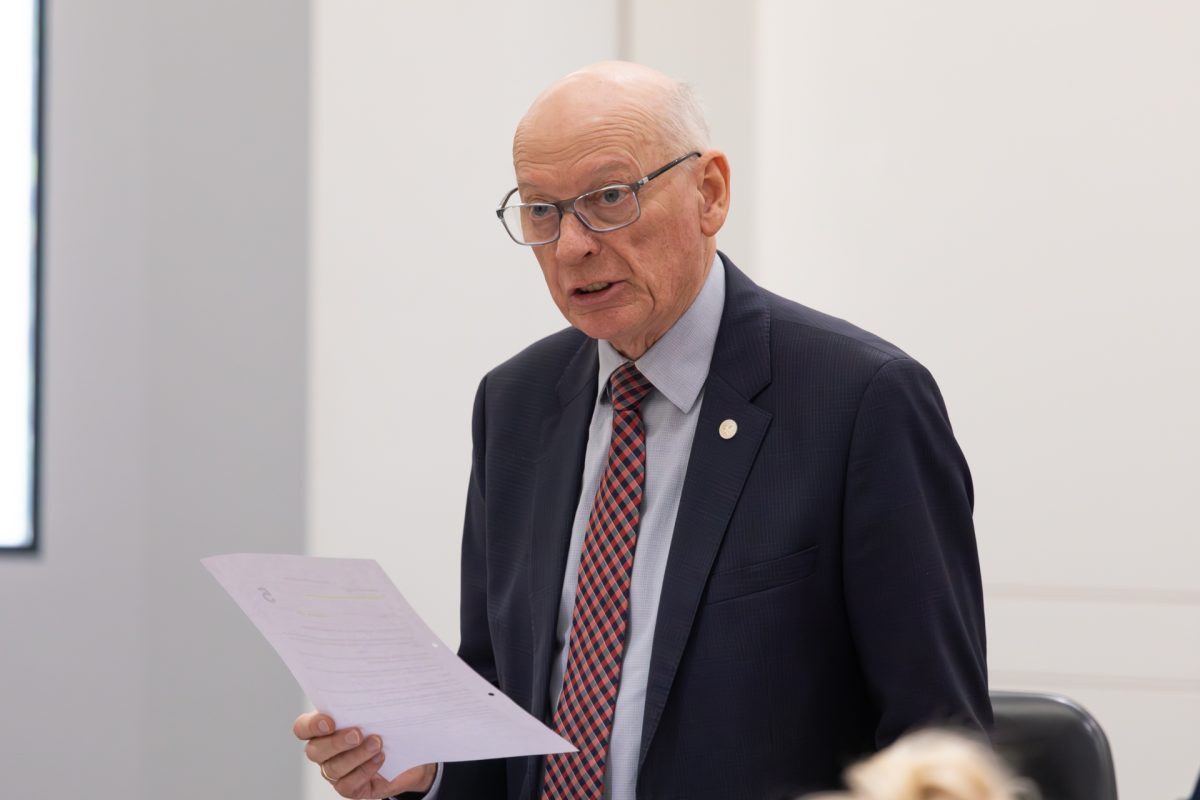
Liberal shadow attorney-general Peter Cain argues that more weight needs to be given to the risks posed to victims of violence. Photos: Michelle Kroll.
People charged with domestic and family violence offences should only be able to access bail in special or exceptional circumstances, Liberal shadow attorney-general Peter Cain has urged in a dissenting section of an Assembly committee inquiry report.
As Chair of the Standing Committee on Justice and Community Safety that inquired into the administration of bail, Mr Cain said the seriousness of domestic and family violence offences, along with the high risk of reoffending and the subsequent risk to victims, should be more strongly reflected in the Bail Act.
“Such offences should, therefore, be added to the schedule of offences for which there is a presumption against bail,” he said.
Mr Cain cited an ACT Policing submission arguing that unless there were exceptional circumstances, family violence offenders should be refused bail due to the high level of risk they posed to victim/survivors.
The submission included an example of a family violence offender being granted bail twice, despite twice breaching the conditions of his Family Violence Order, including a violent assault on the victim in which he threatened to kill her. The offender went on to murder his victim and is now serving a 15-year jail sentence.
It urged a review of the offences for which there is a presumption against bail and called for offences committed in a family violence setting to be added to that list.
ACT Policing said that if the presumption for these offences was not changed, the Bail Act should be amended to require magistrates to consider the likelihood of non-compliance with bail conditions for ‘fixated family violence offenders’, especially those with a history of breaching family violence orders.
Mr Cain noted concerns from the Victims of Crime Assistance League (VOCAL) ACT about the high rates of recidivism for alleged offenders of domestic and family violence. It called for the risks to victims to be given greater consideration when bail conditions are set.
He acknowledged that Senior Director, Victim Support ACT Margie Rowe believed that more evidence was needed before making legislative changes.
“Our position at the moment is that we would like to see evidence about how the whole bail system is working before we came to a position on presumptions,” Rowe told the committee.
“Our position is that we do not support a change to the legislative framework without prior consideration of whether it is working or whether it is not working because of features other than the legislation itself.”
But Mr Cain came out in favour of the government legislating to include violent offences in a family or domestic environment in the schedule of offences where there is a presumption against bail.

Attorney-General Shane Rattenbury said bail issues were a source of constant tension in the judicial system.
Other committee members, Labor’s Dr Marisa Paterson and the ACT Greens’ Andrew Braddock, were also concerned about bail breaches but recommended that the ACT Government review the type and use of bail conditions for people charged with domestic and family violence offences to improve compliance.
Bail laws are a continuing source of controversy, particularly in cases where accused people commit further offences while free awaiting a court appearance.
While some consider bail too easy to obtain and courts too soft, others point to the high number of people on remand in jail.
The committee made 17 recommendations, including that the government implement the use of electronic monitoring, or bracelets, especially for alleged and proved domestic violence offenders, as well as providing a receiver to alert those at risk.
Concern that magistrates were making decisions without all the facts was reflected in a call for the government to review procedures to ensure that courts have sufficient information on the person’s full criminal history, physical health, issues with alcohol and other drugs, mental health and disability when making bail decisions.
The over-representation of First Nations people in the prison system drove a recommendation that a modernised Bail Act explicitly requires the decision to consider Aboriginality, including cultural background, ties to family and place, and cultural obligations.
To stop the practice of alleged offenders arrested on the weekend having to wait until Monday morning to seek bail, the committee recommended that the Magistrates Court sit permanently on Sundays to just consider bail applications.
The committee also urged early intervention for those at risk of breaching bail and more wraparound support for those on bail, particularly young Aboriginal people.
It said the government should find out why the number of people on remand was increasing, why some failed to appear in court, and why some supervised bail orders did not work out.
Attorney-General Shane Rattenbury said bail issues were a source of constant tension in the judicial system, but human rights jurisprudence pointed to the presumption of bail.
“There is real tension in bail decisions between the presumption of innocence and a recognition that bail is not a form of punishment through to making sure that people who are on bail don’t recommit offences, don’t interfere with witnesses and don’t threaten community safety,” Mr Rattenbury said.
“The Bail Act is very clear in weighing up all of those factors, and members of the judiciary need to operate on the facts in front of them to try to make that difficult decision.
“But in the ACT, we have three categories – presumption of bail generally for offences that will not result in custody, a neutral presumption and a presumption against …. and they are at the more serious end of the spectrum.”
Mr Rattenbury said the move to electronic monitoring was well underway.
“I see real opportunity in electronic monitoring for keeping the community safer and getting a better response to the parole or bail conditions,” he said.
The government has until 3 December to respond to the report.





















